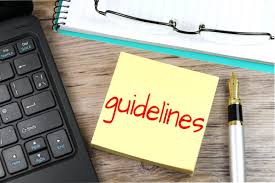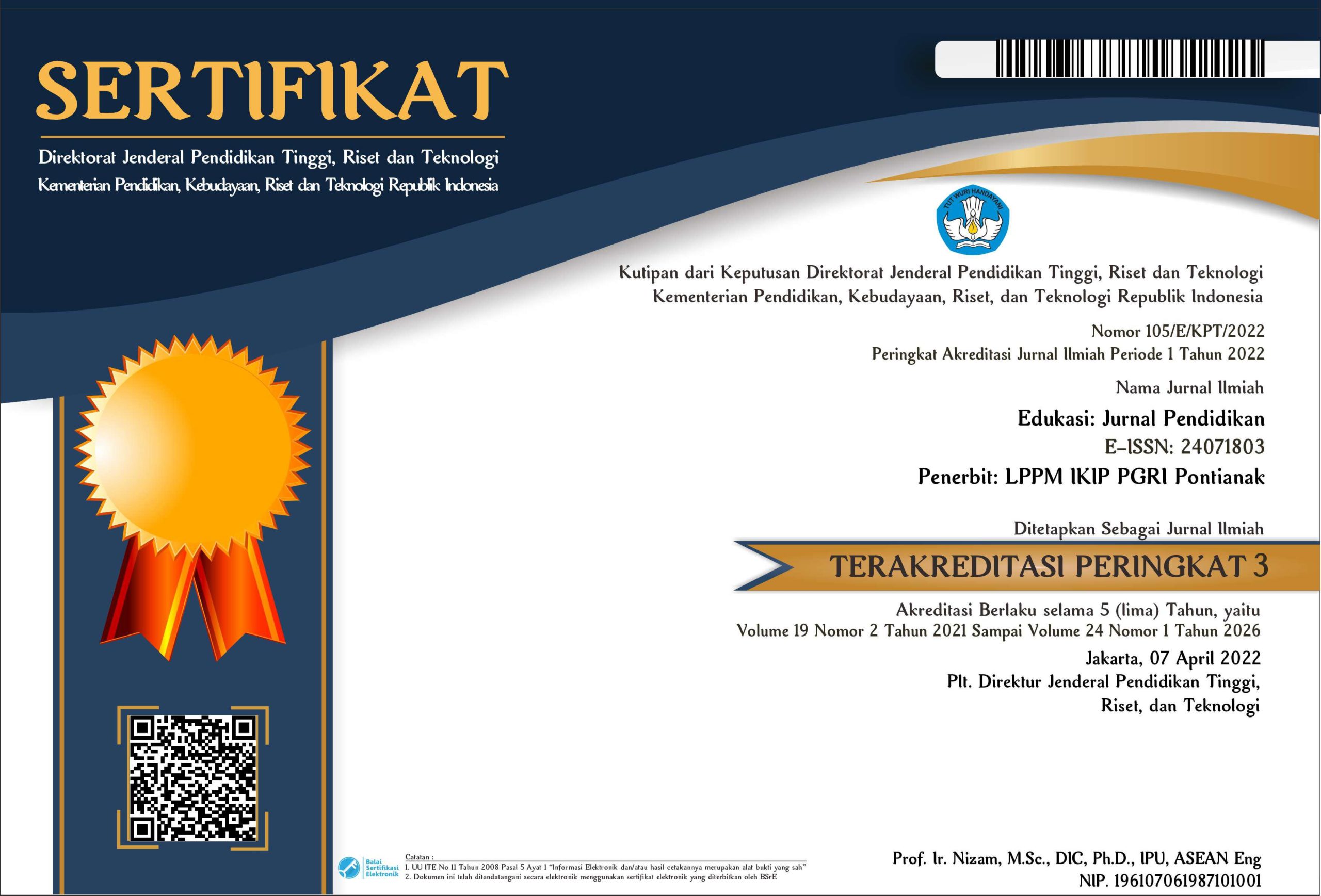Pengembangan Instrumen Microteaching Berdasarkan Pembelajaran Abad ke-21
DOI:
https://doi.org/10.31571/edukasi.v19i1.2348Keywords:
pengembangan instrumen, Microteaching, pembelajaran abad ke-21, development instrument, 21st century learningAbstract
Abstrak
Penelitian bertujuan untuk mengembangkan instrumen Microteaching berkesesuaian dengan keterampilan abad ke-21 yang valid dan reliabel sehingga layak digunakan. Bentuk penelitian yang digunakan adalah Research and Development (R&D) dengan mengikuti alur pengembangan ADDIE (Analyze, Design, Develop, Implement, and Evaluate). Subjek penelitian yaitu 30 dosen dan 70 mahasiswa. Validitas instrumen menggunakan Content Validity Index dan Face Validity yang menunjukkan bahwa instrumen dinyatakan valid. Reliabilitas instrumen menggunakan koefisien interkelas korelasi pada merancang dan melaksanakan pembelajaran dan diperoleh nilai koefisien interkelas korelasi dengan kategori sangat reliabel. Berdasarkan hasil penelitian disimpulkan bahwa instrumen yang dikembangkan valid dan layak digunakan untuk mengukur keterampilan peserta Microteaching dalam merancang dan melaksanakan proses pembelajaran abad ke-21.
Â
Abstract
The aim of this research was to develop Microteaching assessment instrument that are compatible with the 21st-century skill that is valid and reliable so that appropriate to use. The design of this research was Research and Development (R&D) which refers to ADDIE (Analyze, Design, Develop, Implement, and Evaluate). The research subjects were 30 lecturers and 70 students. The validity of the instrument using the Content Validity Index and Face Validity showed that the instrument was valid. Instrument reliability was using the intraclass correlation coefficient in designing and implementing the learning process obtained result as very reliable. It can be concluded that the developed instrument was valid to be used in assessing participant’s Microteaching skills in designing and implementing the 21st-century learning process.
Downloads
References
Adi, I. P. P. (2015). Sistem evaluasi dan kesiapan pelaksanaan PPL-real di sekolah mitra. JPI (Jurnal Pendidikan Indonesia), 4(2), 657-665. https://doi.org/ 10.23887/ jpi-undiksha.v4i2.6062.
Alismail, H. A., & McGuire, P. (2015). 21st century standards and curriculum: Current research and practice. Journal of Education and Practice, 6(6), 150-154.
Arahim, I. A. (2018). Pengembangan lembar kerja siswa dengan visualisasi berbantu Macromedia Flash pada pembelajaran Matematika. Edukasi: Jurnal Pendidikan, 16(1), 116-123. http://dx.doi.org/10.31571/ edukasi.v16i1.842.
Branch, R. M. (2009). Instructional design: The ADDIE approach. New York: Springer Science & Business Media.
Chalkiadaki, A. (2018). A systematic literature review of 21st century skills and competencies in primary education. International Journal of Instruction, 11(3), 1-16. https://doi.org/10.12973/iji.2018.1131a.
Dewi, K. T. (2018). Developing assessment instrument based curriculum 2013 for teaching Micro Teaching in English Education Department of Undiksha. International Journal of Social Sciences and Humanities, 2(3), 95-106. https://doi.org/10.29332/ijssh.v2n3.205.
Faulkner, J., & Latham, G. (2016). Adventurous lives: Teacher qualities for 21st century learners. Australian Journal of Teacher Education, 41(4), 137-150. https://doi.org/10.14221/ajte.2016v41n4.9.
Gregory, R. J. (2013). Psychological testing: History, principles and applications (7th edition). Wheaton College: Pearson.
Khuriyah. (2017). Analisis pelaksanaan Microteaching mahasiswa Program Studi Pendidikan Agama Islam. At-Tarbawi: Jurnal Kajian Kependidikan Islam. 2(2), 175-194. https://doi.org/10.22515/attarbawi.v2i2.990.
Mishra, P., & Mehta, R. (2017). What we educators get wrong about 21st-century learning: Results of a survey. Journal of Digital Learning in Teacher Education, 33(1), 6-19. https://doi.org/10.1080/21532974.2016.1242392.
Mora, J. N. C., Silva, F. B., Lopez, R. R., & Cortez, R. E. C. (2016). Design, adaptation and content validity process of a questionnaire: A case study. International Journal of Management (IJM), 7(7), 204-216.
Moser, D. (2017). Driving 21st century learning. R&E-SOURCE (Open Online Journal for Research and Education), Special Issue, 115-125.
Murtafiah, W., & Lukitasari, M. (2019). Developing pedagogical content knowledge of mathematics pre-service teacher through Microteaching lesson study. Jurnal Pendidikan Matematika, 13(2), 201-218. https://doi.org/10.22342/jpm.13.2.7663.201-218.
Nurhayati, N., Saputri, D. F., & Assegaf, S. L. H. (2019). Pengembangan instrumen tes keterampilan proses sains pada materi Fisika untuk siswa sekolah menengah pertama. Edukasi: Jurnal Pendidikan, 17(2), 145-158. http://dx.doi.org/10.31571/edukasi.v17i2.1250.
Papa-Gusho, L., & Biçaku-Çekrezi, R. (2015). Factors that affect effective planning skills of the teacher in the classrooms. Academic Journal of Interdisciplinary Studies, 4(3), 560-564. https://doi.org/10.5901/ajis.2015. v4n3s1p560.
Rahayu, S., & Mertha, I. (2017). Pengembangan bahan ajar Micro Teaching untuk melatih kompetensi pedagogik calon guru. Jurnal Pendidikan Fisika dan Teknologi, 3(2), 232-238. https://doi.org/10.29303/jpft.v3i2.418.
Setiawan, I., & Mulyati, S. (2019). Efektivitas mata kuliah Pembelajaran Mikro (Microteaching) terhadap keterampilan dasar mengajar dan kesiapan mengajar (Survey pada mahasiswa FKIP semester genap T.A 2017/2018). Equilibrium: Jurnal Penelitian Pendidikan dan Ekonomi, 15(02), 51-60. https://doi.org/10.25134/equi.v15i02.1619.
Shekhar, P., Demonbrun, M., Borrego, M., Finelli, C., Prince, M., Henderson, C., & Waters, C. (2015). Development of an observation protocol to study undergraduate engineering student resistance to active learning. International Journal of Engineering Education, 31(2), 597-609.
Subagia, I. W., & Wiratma, I. G. L. (2016). Profil penilaian hasil belajar siswa berdasarkan kurikulum 2013. JPI (Jurnal Pendidikan Indonesia), 5(1), 39-55. https://doi.org/10.23887/jpi-undiksha.v5i1.8293.
Taherdoost, H. (2016). Validity and reliability of the research instrument: How to test the validation of a questionnaire/survey in a research. International Journal of Academic Research in Management (IJARM), 5(3), 28-36. https://doi.org/10.2139/ssrn.3205040.
Tazali, I. (2017). Implementasi program Micro Teaching bagi guru Bahasa Arab di Pesantren Ar-Raudhatul Hasanah Medan. EDU-RILIGIA: Jurnal Ilmu Pendidikan Islam dan Keagamaan, 1(2), 222-234. https://doi.org/ 10.47006/er.v1i2.899.
Yane, S., & Rustanto, H. (2020). Pengembangan instrumen identifikasi bakat dan program pelatihan fisik bagi calon atlet O2SN. Jurnal Pendidikan Olah Raga, 9(2), 202-211. http://dx.doi.org/10.31571/jpo.v9i2.1458.
Yunus, M., Andari, K. D. W., & Islam, M. A. (2017). The Principal’s competences in implementing cultural and environmental management of the school in SDN 033 Tarakan. JPI (Jurnal Pendidikan Indonesia), 6(2), 263-273. https://doi.org/10.23887/jpi-undiksha.v6i2.11982.
Yusoff, M. S. B. (2019). ABC of content validation and content validity index calculation. Education in Medicine Journal, 11(2), 49-54. https://doi.org/ 10.21315/EIMJ2019.11.2.6.
Downloads
Published
How to Cite
Issue
Section
License
Authors who publish in this journal agree to the following terms:
- Authors retain copyright and grant the journal the right of first publication with the work simultaneously licensed under a Creative Commons Attribution License (CC-BY-NC) that allows others to share the work with an acknowledgment of the work's authorship and initial publication in this journal.
- Authors are able to enter into separate, additional contractual arrangements for the non-exclusive distribution of the journal's published version of the work (e.g., post it to an institutional repository or publish it in a book), with an acknowledgment of its initial publication in this journal.
- Authors are permitted and encouraged to post their work online (e.g., in institutional repositories or on their website) prior to and during the submission process, as it can lead to productive exchanges, as well as earlier and greater citation of published work.

 Download: 498
Download: 498


















